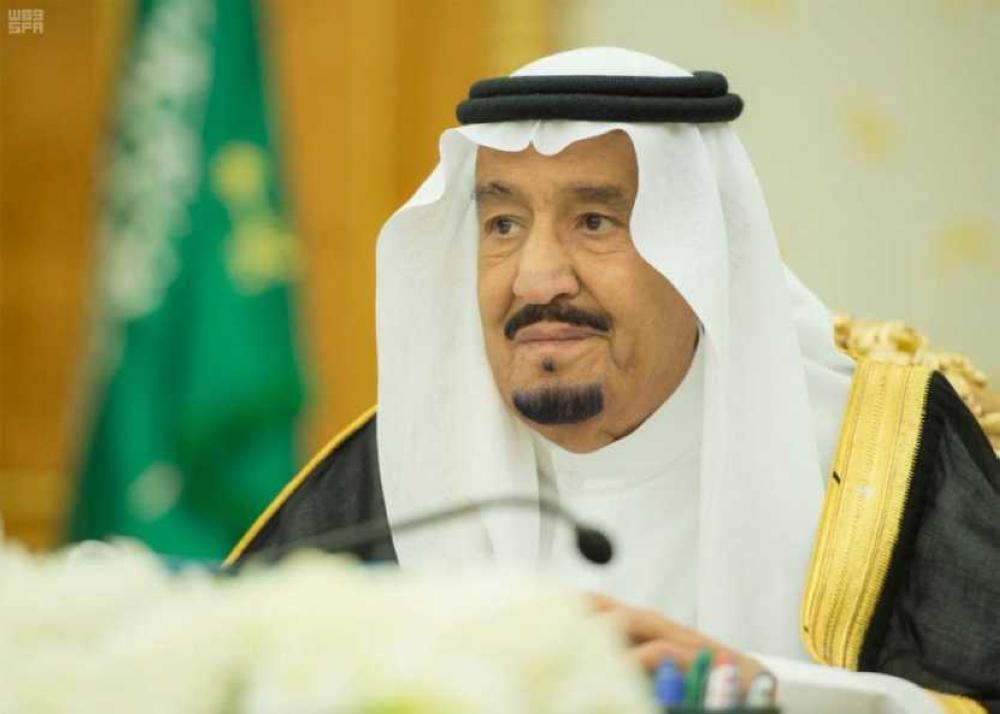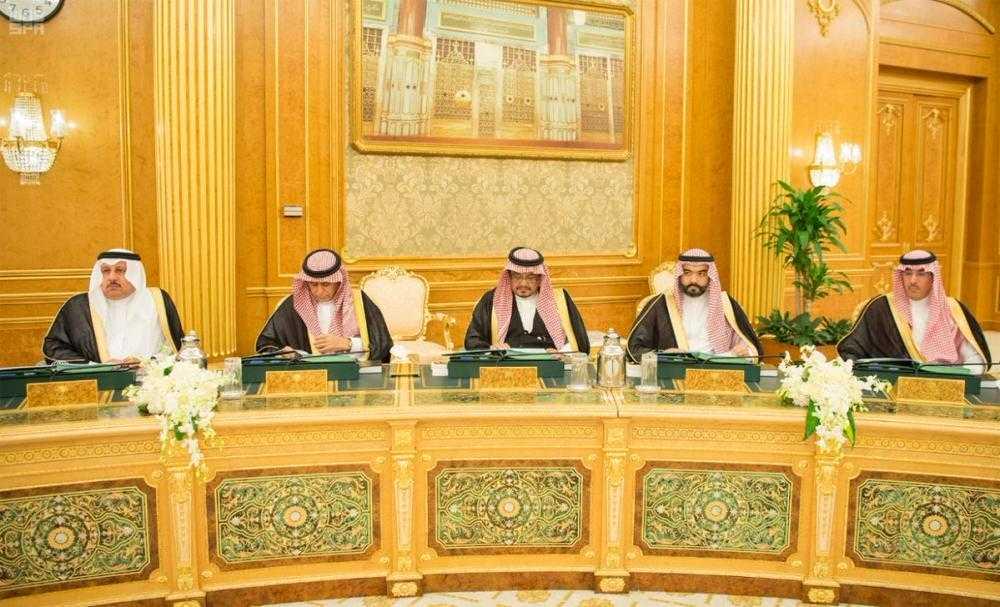The Custodian of the Two Holy Mosques King Salman bin Abdulaziz Al Saud chaired the Cabinet's session at Al-Yamamah Palace in Riyadh on Tuesday afternoon.
At the outset of the session, the King briefed the Cabinet on the phone call with President Donald Trump of the United States of America during which the King affirmed the Kingdom's support and welcome of the firm strategy announced by the President towards Iran, its aggressive activities and support for terrorism in the region and the world, as well as the Kingdom's affirmation of its full commitment to continue working with its partners in the United States of America to achieve the desired goals announced by the US President.
The King also briefed the Cabinet on the results of his meeting with Sheikh Sabah Al-Ahmad Al-Jaber Al-Sabah, Emir of the State of Kuwait, during which they reviewed bilateral relations and discussed overall events in the region, and the phone call with President Mahmoud Abbas of the State of Palestine briefing the King on the Palestinian reconciliation agreement and the King's emphasis that the unity is the basis of the way to enable the Palestinian government to serve its citizens, and the Kingdom's looking forward that this important achievement realizes hopes and aspirations of the brotherly Palestinian people.
The King briefed the Cabinet on the telephone call with Prime Minister Dr. Haider Al-Abadi of the Republic of Iraq during which the King stressed the Kingdom's support for Iraq's unity, security, stability, and the adherence of all parties to the Iraqi constitution for the interest of Iraq and its people.
The Minister of Culture and Information Dr. Awwad bin Saleh Al-Awwad said in a statement to Saudi Press Agency following the session that the Cabinet was briefed on what was submitted by the Minister of Justice on the completion of the transfer of the Commercial Judiciary from the Board of Grievances to the Public Judiciary in the Ministry of Justice and specialized commercial courts started their works on 1/1/1439AH in implementation of the King's directives to develop the judicial facility in accordance with the provisions of the judicial system and the executive action mechanism issued by the Royal Decree dated on 19/9/1428 AH, considering this step as a quantum leap in the march of the judiciary in the Kingdom.
The Cabinet commended the efforts made by the Ministry of Justice; the Supreme Judicial Council and the Board of Grievances in this regard, praising the completion of the transfer of commercial courts to the public judiciary, which will contribute to strengthening the business environment, encouraging and motivating investment in the Kingdom, and supporting the movement of economic development.
The Cabinet reviewed a number of issues and events at the regional and international arenas, pointing out to what the Kingdom has revealed before the annual meetings of the International Monetary Fund (IMF) and the World Bank (WB) in Washington, of the developments of the Kingdom's economy and its efforts in implementing the Vision 2030 and its operational programs and initiatives through the active role of financial and monetary policies and the structural reforms in ensuring the growth of the non-oil sector and enhancing its strength as well as the efforts being exerted to improve the investment environment, support the private sector and promote investors' confidence, contributing to the implementation of the necessary reforms to support the growth and development of the region's countries.
Dr. Awwad bin Saleh Al-Awwad said that the Cabinet appreciated the generous attention and care being attacked by the Kingdom to the holy Quran, including the Custodian of the Two Holy Mosques' patronage of King Abdulaziz International Competition for Holy Quran Memorization, Recitation and Interpretation at its thirty-ninth session in which 121 contenders from 81 countries have participated and the Competition concluded its activities at the Grand Mosque in Makkah.
The Cabinet affirmed the Kingdom's strong condemnation and denunciation of the attacks that targeted security points in the city of El-Arish in northern Sinai in the Arab Republic of Egypt; the two explosions hit the Somali capital and the attack took place inside a mosque in the town of Kempe in Central African Republic, resulted in the killing and injury of scores including security men, renewing its stand with those countries against extremism and terrorism and expressing its sympathy and condolences to the victims, wishing a speedy recovery to the wounded.
Dr. Awwad bin Saleh Al-Awwad said that the Cabinet was briefed on the topics of its agenda, including some which were co-reviewed by the Shura Council earlier. The Cabinet took the following decisions:
First:
The Cabinet authorized the Minister of Economy and Planning, or his deputy, to discuss and co-sign with the Korean side a memorandum of cooperation between the Government of the Kingdom of Saudi Arabia and the Government of the Republic of Korea on the implementation of the Saudi-Korean Vision 2030.
Second:
The Cabinet authorized the Minister of Energy, Industry and Mineral Resources, who is also Chairman of the Board of Directors of King Abdullah City for Atomic and Renewable Energy, or his deputy, to discuss with the Moroccan side a draft framework agreement for cooperation in the fields of peaceful uses of atomic energy between the Government of Saudi Arabia and the Government of the Kingdom of Morocco, sign it and forward the final version to complete the formal procedures.
Third:
The Council Cabinet authorized the Governor of the Saudi Arabian Monetary Agency (SAMA), or his deputy, to discuss with the UAE side a draft memorandum of understanding between the Government of the Kingdom of Saudi Arabia and the Government of the United Arab Emirates in the field of financial services and markets, sign it and forward the final version to complete the regular procedures.
Fourth:
The Cabinet approved, upon recommendation of the economic affairs and development council, the Petroleum Products Trade System.
The most notable features of the system are as follows:
1- The system aims to regulate all aspects of commercial activity related to trade in petroleum products covering the usage, sale, transport, storage, distribution, import, and export.
2- It is not permissible to use petroleum products that the State has priced other than a fuel in incineration operations, etc. in the means of transportation, industry or others, as specified in the executive regulations of this system. Only if an international price is offered, Petroleum products could be used as an industrial ingredient.
3- The General Customs Department shall collect the amounts equal to the difference between the price set by the State for the product poised for exportation and its price in international markets, and transfer it to the State Treasury.
Fifth:
The Cabinet ordered that government employees sent to work in Saudi diplomatic missions abroad e.g. judges, teachers, and others will be subject to the rules governing the conditions of Saudi employees who are seconded to work outside the Kingdom of Saudi Arabia, whose salaries are paid by the Saudi government.
The government agencies shall prepare annual schedule for sending their employees abroad, taking into consideration to adjust their dependents school timetable.
Sixth:
Upon recommendation of the Council of Economic Affairs and Development, the Cabinet approved the formation of the Board of Directors of the General Establishment of Railways for a period of one year, effective the date of issuance of the decision, as follows:
The Minister of Transport will chair the board with the following appointees as members:
1 - Mohamed bin Mazyad Altwaijri
2 - Dr. Rumaih bin Mohammed Al-Rumaih
3 - Dr. Abdullah bin Hasan Al-Abdalqader
4 - Dr. Abed bin Abdullah Al-Saadoun
5 - Yasser bin Abdullah Al-Salman
6. Terry Lee Schindlger
7 - Eng. Faydahr Katchrow.
Seventh:
The Council of Ministers appointed the following as members of the Board of Directors of the General Commission for Tourism and National Heritage for a period of three years:
1 - Prince Abdulaziz bin Fahd bin Abdullah Al Saud
2- Dr. Khalid bin Abdullah Al-Sabti
3. Dr. Khalid bin Abdul Qader Taher
4 - Eng. Nasser bin Abdul Razzaq Al-Nafisi
5 - Adel bin Abdul Aziz Al Qureshi
6 - Dr. Fahad bin Ibrahim Al-Jarboo
7 - Dr. Sami bin Abdullah Al-Obaidi.
Eighth:
Upon recommendation of the Council of Economic Affairs and Development, the Cabinet decided to add the Saudi Contractors Authority to the membership of the committee formed by the Ministry of Finance to establish procedures and controls necessary to regulate financing of contractors.
Ninth:
The Council of Ministers appointed Dr. Saleh bin Abdulrahman Al-Amro as member of the Board of Directors of the General Authority for Small and Medium Enterprises representing the Human Resources Development Fund.
The Cabinet also reviewed a number of general issues on its agenda, including annual reports of the Ministry of Social Affairs (formerly), the General Establishment of Railways and the Saudi Exports Development Authority for a previous fiscal year. The Council took the necessary instructions.



